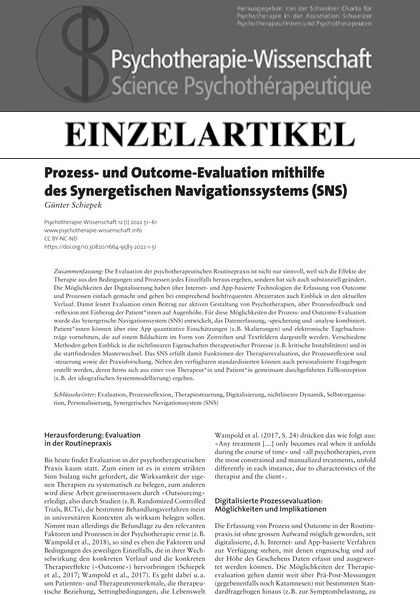Process and outcome evaluation with the help of the Synergetic Navigation System (SNS)
DOI:
https://doi.org/10.30820/1664-9583-2022-1-51Keywords:
evaluation, real-time monitoring, process feedback, feedback-driven practice, practice-based research, self-organization, personalization, Synergetic Navigation System (SNS)Abstract
Process and outcome in psychotherapy can be seen as results of a self-organizing system which includes all factors contributing to success or failure in a specific case: patient and therapist factors, the therapeutic alliance, the setting, the living environment of the patient, interventions and all intended or unintended treatment components. In consequence, evaluation has to be implemented in real-world practice, not only in specific studies. New methods of digitalized outcome and process monitoring like the Synergetic Navigation System (SNS) facilitate the assessment and the analysis of self-organized dynamics and outcome in psychotherapy. In routine-practice, daily self-assessments mirror the complex dynamics of change and deliver the data base for the automatically applied nonlinear analysis methods on time series. The visualization of the therapeutic process on a computer screen allows the cooperative reflection of the dynamics by patient and therapist (continuous cooperative process management). By this, the evaluation of processes actively contributes to change dynamics and is a learning process of its own. By using the SNS not only standardized outcome and process questionnaires can be applied but also personalized questionnaires which are created by the patient and the therapist from a systemic case conceptualization (idiographic system modelling).
Downloads
How to Cite
Schiepek, G. (2022). Process and outcome evaluation with the help of the Synergetic Navigation System (SNS). Psychotherapie-Wissenschaft, 12(1), 51–61. https://doi.org/10.30820/1664-9583-2022-1-51
Issue
Section
Special Issue
License

This work is licensed under a Creative Commons Attribution-NonCommercial-NoDerivatives 3.0 Unported License.
This journal provides open access to its content in accordance with the basic premise that the free public availability of research benefits the exchange of knowledge throughout the world.
Authors wishing to publish in this journal agree to the following:
- The author/s retain/s the copyrights and consent/s to initial publication of the work in the journal under a Creative Commons Attribution licence, which allows third parties to use the work by citing the name/s of the author/s and this journal as initial publisher (in accordance with the Creative Commons Attribution-NonCommercial-NoDerivs 3.0 DE-Licence).
- The author/s can enter into additional contracts for the non-exclusive distribution (e.g. publish in a collection or book) of the version published in the journal, if the journal is cited as initial publisher.


